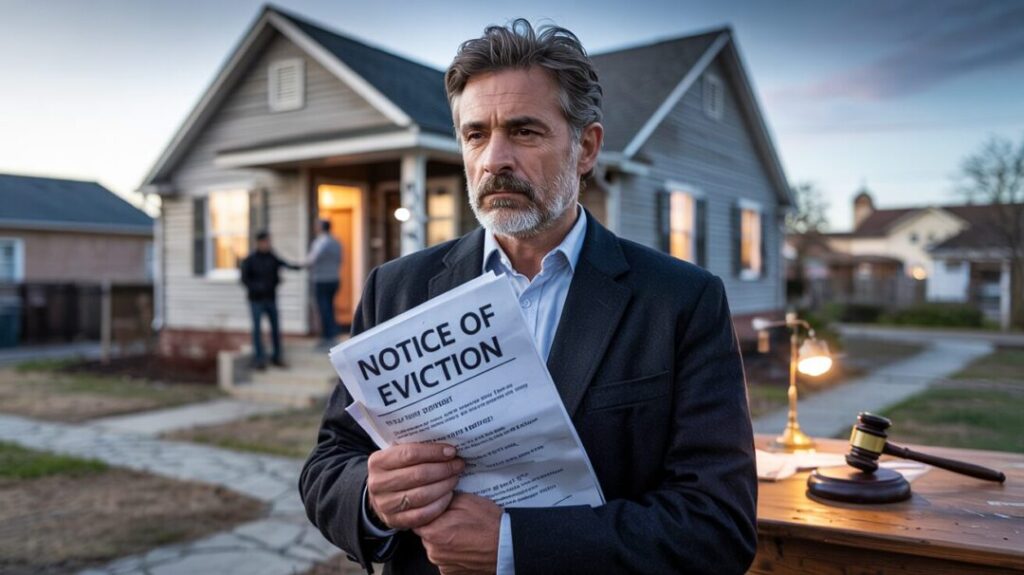Do laws even matter anymore?
That’s the question one frustrated Nevada landlord asked after winning an eviction case – but then watching the process drag on for weeks beyond the court date.
This is just one landlord’s story out of a number that highlight a growing problem in Nevada’s rental market:
What happens when the legal system is written one way but practiced another?
The Problem Property Owners Face
Here’s the situation:
You follow all the rules. You provide proper notice.
You go to court. You prove your case. You win.
Then you wait. And wait some more.
A tenant who stopped paying rent in May gets to stay until October.
This isn’t a one-off situation. Landlords across Nevada are reporting similar experiences.
A source shared with us that after winning a recent eviction, they were asked by the tenant for extra time.
“I won the eviction, but the tenant asked if she could have until the end of September to move. I said no, as she’s already had 4 months of not paying rent and should leave,” the source shared.
They continued, “The activist judge said the eviction is granted, but he would not sign the eviction until the afternoon of 9/24 – so it won’t go to the constable office until 9/25. And because that office is closed on Fridays, she will get until 9/30 or 10/1 before they will do the lock out.”
Our source also told us the judge is considering wiping the eviction from the tenant’s record completely.
“He also told her if she moves out before the lock out to come back to him and he will erase the eviction from her record,” they shared. “Do laws even matter anymore?”
A Predictable Pattern
The pattern is becoming familiar. Tenants fall months behind on rent.
Landlords file for eviction. The court grants it.
Then judges use their discretion to extend timelines or otherwise delay enforcement of the eviction.
On the surface it sounds compassionate – but it creates real problems.
When the Law Becomes Unpredictable
Nevada’s eviction laws are supposed to balance competing interests.
Tenants need protection from arbitrary removal.
Landlords need to collect rent or regain their property in a reasonable timeframe.
The system depends on predictability.
When judges extend timelines beyond what the law suggests, that predictability disappears.
Landlords can’t plan, can’t budget, can’t tell their mortgage company or insurance provider when they’ll have income again.
The Financial Reality
Consider the math. Four months of unpaid rent at Nevada’s median rent price means thousands in losses.
Add filing fees, potential legal costs, and the inability to rent to a paying tenant during extended court timelines.
Small landlords who own just a few properties can face financial ruin.
According to the National Association of Realtors, eviction processes nationwide average three weeks to three months, but local court practices can push that much longer.
In Nevada, landlords report waiting well beyond statutory timelines even after winning their cases.
The Pandemic Hangover
The pandemic-era eviction moratoriums ended, but their effects linger.
Some property owners say courtroom culture hasn’t fully shifted back.
Judges who grew accustomed to finding reasons to delay evictions during the emergency period sometimes continue that approach.
Property rights advocates argue this amounts to forced charity.
When someone wins a legal judgment but can’t enforce it, what’s the point of going to court?
The law says landlords can evict for non-payment, but the practical reality may be weeks or months of additional free housing for tenants.
Two Sides of the Story
Tenant advocates see it differently. They argue that evictions devastate families.
A few extra days can mean the difference between homelessness and finding new housing, especially for families with young children.
The Nevada Coalition of Legal Service Providers documents how evictions lead to job loss, school disruption, and long-term economic hardship.
Both sides have valid concerns.
Nobody wants families on the street – but nobody should be forced to provide free housing indefinitely either.
This idea of erasing evictions in exchange for voluntary move-outs adds another wrinkle.
It helps tenants find new housing without the mark of an eviction on their record, but critics say it creates moral hazard.
If there are no lasting consequences for breaking a lease, what incentive exists to pay rent?
Some states have addressed this by setting strict timelines that limit judicial discretion. Others have created emergency assistance funds to help tenants catch up on rent, preventing evictions altogether.
Nevada has some assistance programs, but they often run out of funding or have lengthy application processes.
Bringing it Home
The core issue is fairness.
When landlords follow the law and win in court, they expect enforcement to be swift and certain.
When tenants receive legal judgments against them, they should face predictable consequences.
Right now, Nevada’s system delivers neither.
For landlords, winning an eviction case has become just the first step in an unpredictable process.
The rules exist, but their application varies widely based on which judge hears the case.
That uncertainty ripples through the entire rental market.
Some landlords respond by increasing security deposits or becoming more selective about tenants, making it harder for people with imperfect credit or rental histories to find housing. Others exit the rental business entirely, reducing available housing stock.
The question isn’t whether judges should have any discretion. Some flexibility makes sense for unusual circumstances.
The question is whether current practices have swung too far, creating a system where legal victories become hollow.
Nevada needs a rental market that works for everyone.
That means protecting tenants from unfair treatment while ensuring landlords can enforce legitimate judgments.
Right now, the balance feels off.
The opinions expressed by contributors are their own and do not necessarily represent the views of Nevada News & Views. This article was written with the assistance of AI. Please verify information and consult additional sources as needed.




